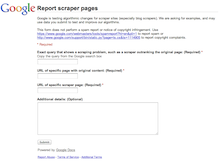 It’s one of the more frustrating experiences for any original content producer. You work hard to craft an interesting, well-researched, readable blog post or article. A day or two later you type the posts primary keywords into Google to see how your content is ranking. And there is your sweat-and-blood work published word-for-word on someone else’s site, and what’s worse, it’s outranking your original posting!
It’s one of the more frustrating experiences for any original content producer. You work hard to craft an interesting, well-researched, readable blog post or article. A day or two later you type the posts primary keywords into Google to see how your content is ranking. And there is your sweat-and-blood work published word-for-word on someone else’s site, and what’s worse, it’s outranking your original posting!
Sites that do this routinely are known as “content farms” or “scraper sites.” While content farms typically post their own low-quality content, they also scrape content from other sites and post it as their own in an attempt to gain traffic and ad revenue. Such stealing is not only frustrating to authors; Google hates it too. Users typically recognize the low quality or “fakeness” of such sites. If they continually encounter them high in search rankings, they will begin to lose trust in the search engine.
Google is now enlisting our help in the war against scraper sites. Using this form, you can report scraper pages to Google. You will be asked to supply three pieces of information:
- The search query that produced a result containing a scraper page that outranked original content.
- The URL of the specific page that contains the original content that was scraped.
- The URL of the scraper page.
Related articles from the web:
- One Year After Panda, Is Your Content Safer? (plagiarismtoday.com)
- Content Scrapers – How to Find Out Who is Stealing Your Content & What to Do About It (kissmetrics.com)









